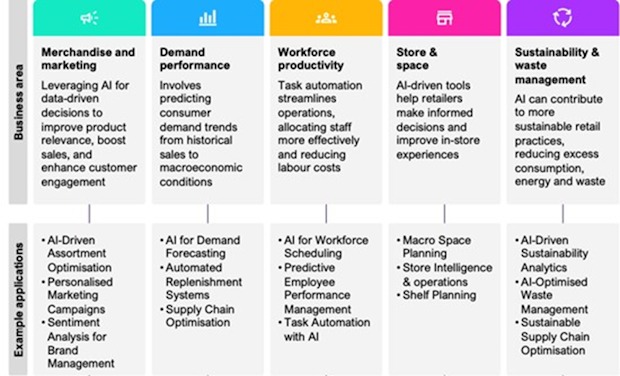Economics research consultancy Retail Economics and SymphonyAI have released results of new market research that highlights the powerful business impact from AI adoption.
However, the study also warns that data silo barriers to AI adoption are preventing laggard retailers from realising transformational potential and underscores the importance of connected retail to unify data and overcome operational silos for streamlined decision-making and efficiency gains.
The research looked at the impact of AI in all major areas of retail, including merchandising and marketing, demand performance, workforce productivity, and store and space and sustainability and waste management. It found that the world’s 200 largest retailers have boosted pre-tax profits by 39.4% and revenue by 31.3% over the past five years while also reducing their carbon intensity (CO₂e produced per $m of sales) by 20.9%.
Surveys with more than 250 retailers across the UK, US, France, Germany, and Canada revealed gains through technological investment, including predictive and generative AI. AI-based connected retail gives retailers dramatically increased operational efficiencies that both increase profits and reduce carbon consumption.
Retail Business Function AI Impact Model

Source: Retail Economics, SymphonyAI
The study notes that connected retail gives users a seamless flow of AI-driven data and insights, strengthening retail operations from the supply chain to the shelf. The Retail Economics research found that AI-driven efficiencies in inventory management, route optimisation, and waste reduction have supported profit growth while reducing carbon intensity. Food retailers experienced the largest reduction in carbon intensity even as profit margins increased. Grocers using AI-based inventory optimisation to prevent over- or under-stocking fresh items and significantly reduce costly and carbon-producing food waste.
Retailers believe the impact of AI on sustainability will accelerate over the next two years as they increasingly seek to increase operational efficiency, profitability, and sustainability. Yet survey data reveals that the impact of AI across business functions in top retailers remains uneven as retailers apply AI in isolated operational areas rather than integrating AI across supply chains and operations. Data quality and availability is the primary hurdle to AI adoption, with access to high-quality, relevant data a major issue across most retail functions.
In business functions such as demand performance and store operations, challenges in integrating AI with legacy systems are also a critical obstacle, while workforce productivity is hampered by cultural resistance and a talent gap in AI skills.
“Connected retail is a must-have for retailers pursuing growth, profitability, and carbon footprint reduction,” said Dusan Rnic, SVP international for the SymphonyAI retail-CPG division.
“Historically, retailers lacked the tools to unlock the potential of connecting all their functions due to data overload – which just happens to be the very essence of AI being successful. AI’s potential to improve efficiency, customer engagement, and sustainability is not just a promise – it is now a reality and is a critical evolution in retail’s journey. Retailers must consider unlocking AI’s full potential, not only to lead in the current marketplace, but to support wider goals like sustainability.”
Richard Lim, CEO at Retail Economics, added: “Leading retailers are demonstrating that investment in AI and technology can drive both profitability and sustainability. However, lagging companies risk missing out on AI’s broader benefits if they don’t prioritise data quality, system integration, and the right talent. By tackling these issues, retailers can achieve efficient growth that supports ambitious sustainability targets across key markets.”



